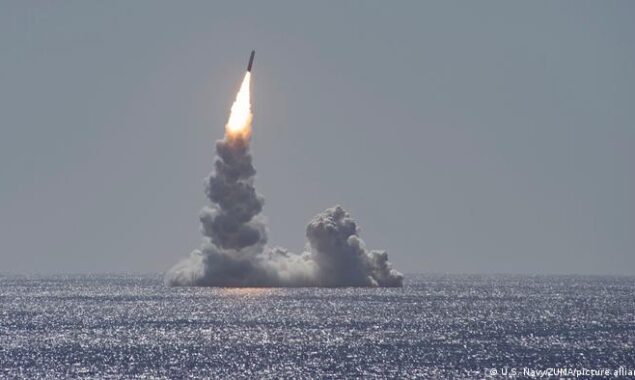
The Air Force confirmed the postponement of its Minuteman III test after Moscow stated earlier on Friday that it will bolster its western boundaries with Europe militarily. The US had earlier postponed the ICBM launch on March 2 after Russia declared its nuclear forces on high alert.
However, it had previously declared that it merely intended to postpone the test “a little bit,” not cancel it.
According to Air Force spokesperson Ann Stefanek, the decision to cancel the LGM-30G Minuteman III missile test was made for the same reasons as when it was initially postponed.
The next Minuteman III test is planned for later this year.
“The Air Force is confident in the preparedness of the United States’ strategic forces,” said Mr Stefanek.
The nuclear-capable Minuteman III is an important element of the US military’s strategic arsenal, with a range of 6,000 miles [9,660 km] and a top speed of 15,000 miles per hour [24,000 kph].
Missiles are stored in fortified underground silos that are manned by launch personnel.
In response, US Defense Secretary Lloyd Austin decided to delay a ballistic missile test slated for early March in order “to demonstrate we are a responsible nuclear power.”
According to Pentagon spokesperson John Kirby, the action was made as a display of “restraint” in the face of indications that Putin would be moving vacuum bombs and cluster munitions across the border.
During a news conference on March 2, he informed the country, “This is not a step backward in our preparedness, nor does it suggest that we would necessarily forgo other normal measures to preserve a credible nuclear capacity.”
“We did not make this decision lightly; rather, we wanted to show that we are a responsible nuclear power.”
“We remain confident in our strategic posture.”
Altering the test schedule for America’s ICBM force can be controversial.
In March, US Senator Jim Inhofe, the senior Republican on the Senate Armed Services Committee, voiced dismay over the postponement of a test he said was important to ensuring America’s nuclear deterrence remained effective.
Jeffrey Lewis, a missile expert at the James Martin Center for Nonproliferation Studies (CNS), downplayed the cancellation’s significance.
“There’s a benefit to performing the exams,” Mr Lewis said, “but I don’t believe skipping one test is a huge problem in the larger scheme of things.”
Russian President Vladimir Putin stated in February that his country’s nuclear forces should be placed on high alert, sparking worries that Russia’s invasion of Ukraine might result in nuclear war.
However, US officials have stated that they see no cause to modify Washington’s nuclear alert levels at this time.
After the Cold War that split the world for most of the twentieth century, putting the West against the Soviet Union and its allies, Russia and the United States have by far the largest arsenals of nuclear weapons.
Read More News On
Catch all the International News, Breaking News Event and Latest News Updates on The BOL News
Download The BOL News App to get the Daily News Update & Follow us on Google News.




